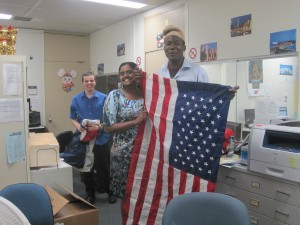Whoever has lived in America for up to a year would have acquired a new kind of identity whether they like it or not. It could be the one they themselves realize, or those that is bestowed upon them from those who occupy a different clime. In the case of someone like me, he might have learnt to spell the word learnt as “learned” and mum as “mom”, to write dates with the month first, to eat pizzas, to shake hands firmly, smile everytime his eyes make contact with a stranger’s, use expressions like “I was like…” and wash clothes with washing machines rather than with hands. If he’s also from Nigeria, like me, he would also have learnt to stay up all night making most use of the internet, or leaving the lamps on in his bedroom for as long as possible. And eating grapes. And getting home deliveries of food whenever one is too tired to cook or to go out. In any case, all those are about to change, along with new disengagements in language.
 I do not yet know the extent of my enslavement or adaptation to the American English speech patterns, and I might not know until I get back home. But this I know for sure, somebody is going to point out to me soon enough when I get to Lagos that “going to the bathroom” could only mean one thing: going to take a shower. If I want to go to the toilet, I will have to say so. I will leave medication in the United States and return to drugs in Nigeria and not feel ashamed to call it that. Old people will return to being old people and not senior citizens, and when I say I’d like to eat yam, I will have yam, I will be sure that impostor potatoes won’t surprise me in the most unexpected part of the plate. Potato chips will return to being potato chips, and the fries will remain the America.
I do not yet know the extent of my enslavement or adaptation to the American English speech patterns, and I might not know until I get back home. But this I know for sure, somebody is going to point out to me soon enough when I get to Lagos that “going to the bathroom” could only mean one thing: going to take a shower. If I want to go to the toilet, I will have to say so. I will leave medication in the United States and return to drugs in Nigeria and not feel ashamed to call it that. Old people will return to being old people and not senior citizens, and when I say I’d like to eat yam, I will have yam, I will be sure that impostor potatoes won’t surprise me in the most unexpected part of the plate. Potato chips will return to being potato chips, and the fries will remain the America.
Let the disengagement begin.
1
Temitayo at http://YourWebsite
Sure your ‘Mom’ wants you back too ;)…now all that disengagement should not touch this blog o 😉 No say I no warn you o.
Posted at April 11, 2010 on 11:56pm.
2
Kola Tubosun at http://www.ktravula.com
Okay Tayo. Warning noted.
Posted at April 19, 2010 on 1:11am.
3
Olayinka Oyegbile at http://YourWebsite
You’re welcome to reality. All these days you’ve been living a dream, the American Dream. I only spent four months, the longest I’ve stayed in the US and when I return it was like a trip to hell.
No light and the heat was stifling. In the US I ironed my clothe only when I want to wear it, but in Nigeria NEPA or whatever name it goes by now would not allow.
Welcome to re-education.
Posted at April 12, 2010 on 6:47am.
4
Kola Tubosun at http://www.ktravula.com
I won’t buy your sentiments though that returning home is like returning to hell. The heaven or the hell is within us to take to wherever we go, I believe. And life goes on. Thanks for stopping by.
Posted at April 19, 2010 on 1:11am.
5
Bukola at http://YourWebsite
Hehehe! But i’m jealous o, very jealous. I want to disengage too 🙂 I’m with Tayo on the warning: thou shalt not disengage this blog!:-)
Posted at April 12, 2010 on 2:25pm.
6
Kola Tubosun at http://www.ktravula.com
🙂 I hear you 🙂 have a nice week.
Posted at April 19, 2010 on 1:09am.
7
DiAmOnD hawk at http://www.diamondhawk.blogspot.com
I definitely get what you’re saying… for me.. it was the word ‘quiz’… i had been used to a quiz being sort of like a game show that we played in school rather than a shorter version of a test/exam.. Please take ‘bathroom’ with you o… cuz when u say toilet… it has some eewwwish quality LOL and besides… bathroom would be a correct term of the room that houses the toilet… the British should take note! 🙂 have a lovely week
Posted at April 14, 2010 on 6:28am.
8
Kola Tubosun at http://www.ktravula.com
Thank you Diamond. Have a lovely week yourself.
Posted at April 19, 2010 on 1:08am.